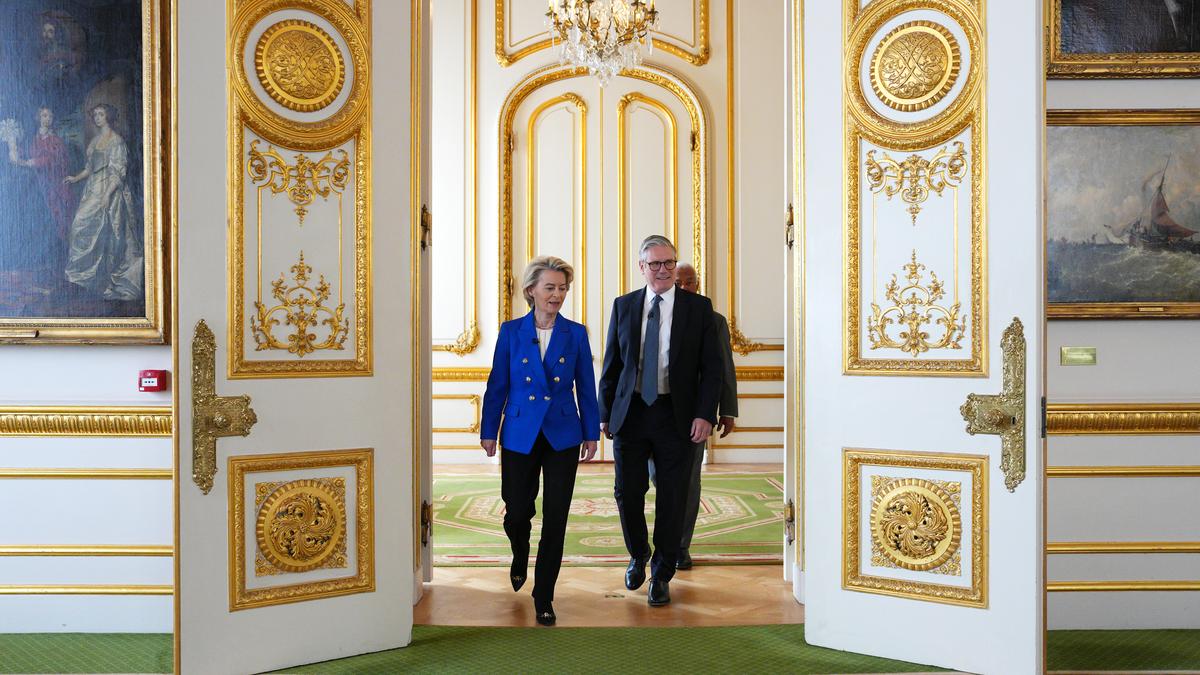U.K.–EU Reset: A Strategic Gateway for India

- 11 Jun 2025
In News:
The recent diplomatic overture by the United Kingdom under Prime Minister Keir Starmer to reset relations with the European Union (EU) marks a pivotal moment in Euro-Atlantic cooperation. Though the development appears Eurocentric, its implications for India are profound — ranging from trade facilitation and foreign policy realignment to diaspora and talent mobility. For India, this evolving Western convergence offers a unique opportunity to recalibrate its economic and strategic engagements.
Redefining India’s Trade Corridors
The renewed UK-EU cooperation — covering food safety, fisheries, customs, and border controls — has the potential to ease operational frictions for Indian exporters that emerged post-Brexit.
- Current Trade Landscape: In FY2024, India’s exports to the EU stood at $86 billion, and to the U.K. at $12 billion, reflecting the strategic importance of these partners.
- Post-Brexit Challenges: Indian businesses, especially in pharmaceuticals, textiles, and agri-products, faced dual regulatory requirements.
- Reset Opportunities: A harmonised regulatory framework can reduce compliance redundancies and lower costs. India, which meets over 25% of the U.K.’s pharmaceutical demand, could benefit from unified drug approvals.
- Sectoral Impact:
- Indian seafood exports (worth approx. $7.38 billion) could see improved access if sanitary and phytosanitary norms are streamlined.
- However, SMEs may face challenges in adapting to tighter European standards.
Policy Recommendation: India must bolster its export competitiveness through schemes like RoDTEP, PLI, and enhanced certification infrastructure to meet higher technical standards.
Deepening Strategic and Diplomatic Ties
A more aligned U.K.-EU foreign and defence policy creates new avenues for India to build deeper multilateral and trilateral engagements.
- Existing Frameworks:
- India–EU: Strategic Partnership Roadmap to 2025
- India–U.K.: Comprehensive Strategic Partnership (2022), covering cybersecurity, climate, and maritime security
- Potential Synergies:
- Enhanced coordination in forums like the UN, G-20, and WTO
- Scope for defence collaboration in the Indo-Pacific through joint naval exercises, technology transfers, and intelligence sharing
India’s partnerships with France, Germany, and the U.K. already focus on defence modernisation and green technologies. A coordinated U.K.–EU posture could formalise India’s role in shaping Western responses to strategic challenges in Asia, especially China’s assertiveness.
Global South Leadership: India can also leverage this alignment to push for climate finance, digital public infrastructure, and multilateral reform, reinforcing its leadership role post-G20 2023.
Reimagining Talent Mobility and Diaspora Engagement
India possesses the world’s largest diaspora, with significant populations in the U.K. and EU.
- Mobility Trends:
- In 2024, the U.K. issued over 1,10,000 student visas to Indian nationals.
- Post-Brexit, mobility of Indian professionals to the EU was curtailed.
- Potential Reset:
- Renewed U.K.–EU coordination on border and migration policy may enable partial mobility reintegration.
- India’s migration pacts with France, Germany, and Portugal could benefit from a wider U.K.–EU framework.
This realignment could lay the groundwork for a semi-integrated talent corridor, enhancing the movement of students, skilled professionals, and researchers.
Conclusion: Strategic Imperatives for India
The U.K.–EU reset is more than a European internal realignment — it is a geostrategic moment that India must strategically exploit. Whether through trade harmonisation, defence diplomacy, or diaspora engagement, India stands to gain significantly. However, to capitalise on this, India must:
- Accelerate trade facilitation and infrastructure modernisation
- Strengthen its regulatory frameworks
- Enhance institutional diplomatic coordination
- Assertively position itself in multilateral platforms
This convergence of economic and diplomatic opportunity presents India with a chance to reshape its place in the evolving global order.
